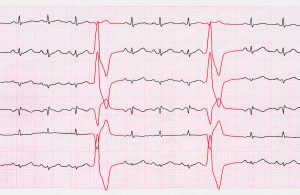 Heart arrhythmia is when there is a problem with the heart’s electrical impulses that coordinate heartbeats, resulting in a rapid heartbeat or a slow one. Feeling like a heart fluttering, oftentimes arrhythmia is not indicative of anything serious. In other cases, a heart arrhythmia is a sign of a problem that requires medical treatment. To tell whether your heart arrhythmia is a cause for concern, you need to see your doctor for necessary diagnostic tests.
Heart arrhythmia is when there is a problem with the heart’s electrical impulses that coordinate heartbeats, resulting in a rapid heartbeat or a slow one. Feeling like a heart fluttering, oftentimes arrhythmia is not indicative of anything serious. In other cases, a heart arrhythmia is a sign of a problem that requires medical treatment. To tell whether your heart arrhythmia is a cause for concern, you need to see your doctor for necessary diagnostic tests.
Heart arrhythmias can be caused by a heart attack, scarring of heart tissue from a previous heart attack, changes in the heart’s structure, blocked arteries to the heart, high blood pressure, diabetes, hyperthyroidism and hypothyroidism, smoking, excessive coffee or alcohol consumption, drug abuse, stress, certain prescription medications, certain dietary supplements, electric shock, and air pollution.
Diagnosis and tests for heart arrhythmia
Advertisement
After reviewing your symptoms and evaluating your medical history, your doctor will also refer you for some testing in order to diagnose heart arrhythmia. These tests include electrocardiogram, holter monitor, event monitor, echocardiogram, and implantable loop recorder. These tests measure the function of the heart by monitoring the organ’s activity.
If these tests are inconclusive, you can also undergo a stress test, tilt table test, or an electrophysiological testing and mapping.
Treatment for heart arrhythmia
 Oftentimes, a heart arrhythmia is not life threatening, so you can easily take the necessary steps to treat it at home. Here are some suggestions:
Oftentimes, a heart arrhythmia is not life threatening, so you can easily take the necessary steps to treat it at home. Here are some suggestions:
- Eat heart-healthy foods
- Exercise
- Quit smoking
- Maintain a healthy weight
- Keep blood pressure and cholesterol in a healthy range
- Drink alcohol in moderation or don’t drink at all
- Get regular check-ups from your doctor
Other medical treatments include getting a pacemaker, taking prescribed medications, or undergoing a surgery such as coronary bypass surgery. One trick that may work is known as vagal maneuvers. Techniques that stimulate the vagus nerves (nerves that control your heart rate) include holding your breath, coughing, or dunking your face in ice water. These techniques don’t work for all types of arrhythmias, so if you don’t find them successful speak to your doctor about other treatments available for your specific case.
There are very easy ways to protect your heart and prevent heart arrhythmias, such as:
- Eating a heart-healthy diet
- Not smoking
- Minimizing caffeine and alcohol consumption
- Reducing stress
- Exercising
- Maintaining a healthy weight
- Lowering blood pressure
- Controlling diabetes
- Exercising caution when taking over-the-counter medications
